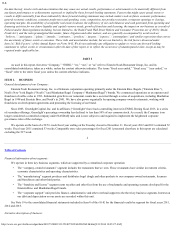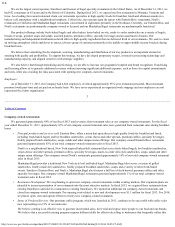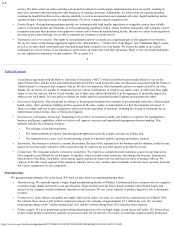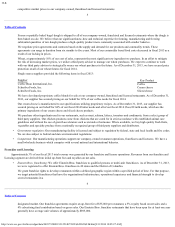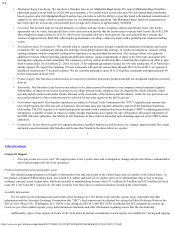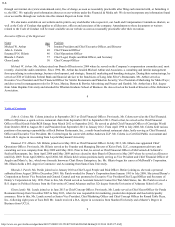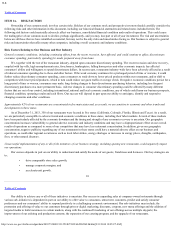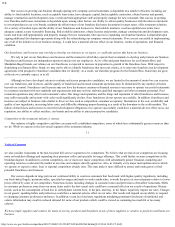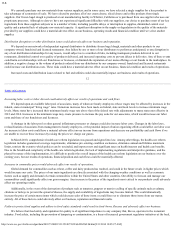Einstein Bros 2013 Annual Report Download - page 13
Download and view the complete annual report
Please find page 13 of the 2013 Einstein Bros annual report below. You can navigate through the pages in the report by either clicking on the pages listed below, or by using the keyword search tool below to find specific information within the annual report.
10-K
http://www.sec.gov/Archives/edgar/data/949373/000119312514073832/d629623d10k.htm[9/11/2014 10:05:27 AM]
Table of Contents
temperatures (either hot or cold) or precipitation, many individuals choose to stay indoors. This impacts transaction counts in our restaurants and
could adversely affect our business and results of operations.
The effects of hurricanes, fires, snowstorms, freezes and other adverse weather conditions are likely to affect the supply of and costs for raw
ingredients and natural resources, near-term construction costs for our new restaurants and in our restaurants going forward. If we do not anticipate
or react to changing costs of food and other raw materials by adjusting our purchasing practices or menu prices, our operating margins would likely
deteriorate.
The impact on our business from terrorism (including cyber-terrorism or efforts to tamper with food supplies) could have an adverse impact
on our brand and results of operations.
Any material failure, inadequacy, interruption or security failure of information technology could harm our ability to effectively operate our
business.
We rely on information technology systems across our operations, including for management of supply chain, point-of-sale (“POS”)
processing in our restaurants, and various other processes and transactions. Our ability to effectively manage our business and coordinate the
production, distribution and sale of products depends on the reliability and capacity of these systems. Despite our implementation of security
measures, all of our technology systems are vulnerable to damage, disability or failures due to physical theft, fire, power loss, telecommunications
failure or other catastrophic events, as well as from internal and external security breaches, denial of service attacks, viruses, worms and other
disruptive problems caused by hackers. The failure of these systems to operate effectively, problems with transitioning to upgraded or replacement
systems, or a breach in security of these systems could cause delays in product sales and reduced efficiency of our operations, and significant
capital investments could be required to remediate the problem.
Credit and debit card data loss, litigation and/or liability could significantly harm our reputation and adversely impact our business.
In connection with credit and debit card sales, we transmit confidential credit and debit card information securely over public networks. Third
parties may have the technology or know-how to breach the security of this customer information, and our security measures may not effectively
prohibit others from obtaining improper access to this information. If a person is able to circumvent our security measures, he or she could destroy
or steal valuable information or disrupt our operations. Several companies in a variety of industries recently have reported security breaches during
which credit/debit card or other personal identifying information has been compromised. Any security breach could expose us to risks of data loss,
litigation and liability and could seriously disrupt our operations and any resulting negative publicity could significantly harm our reputation.
Furthermore, as a result of legislative and regulatory rules, we may be required to notify the owners of the information of any data breaches, which
could harm our reputation and financial results, as well as subject us to litigation or actions by regulatory authorities.
Our restaurants and products are subject to numerous and changing government regulations. Failure to comply with or substantial changes in
government regulations could negatively affect our sales, increase our costs or result in fines or other penalties against us.
Each of our restaurants is subject to licensing and regulation by the health, sanitation, safety, labor, building and fire agencies of the
respective states, counties, cities and municipalities in which it is located. A failure to comply with one or more regulations could result in the
imposition of sanctions, including the closing of facilities for an indeterminate period of time, or third party litigation, any of which could have a
material adverse effect on us and our results of operations.
15
Table of Contents
Recently, many government bodies have begun to legislate or regulate high-fat and high sodium foods and require disclosure of nutritional
information as a way of combating concerns about obesity and health. In addition to the phase-out of artificial trans-fats, public interest groups
have focused attention on the marketing of high-fat and high-sodium foods to children in a stated effort to combat childhood obesity. Some cities
and states have recently adopted or are considering regulations requiring disclosure of nutritional facts, including calorie information, on menus
and/or menu boards. Additional cities or states may propose or adopt similar regulations. The cost of complying with these regulations could
increase our expenses and the possible negative publicity arising from such legislative initiatives could reduce our future sales.
Our franchising operations are subject to regulation by the Federal Trade Commission. We must also comply with state franchising laws and
a wide range of other state and local rules and regulations applicable to our business. In addition, the Dodd-Frank Act and the rules promulgated
thereunder may impose new business or disclosure obligations on us. The failure to comply with or substantial changes in federal, state and local
rules and regulations would have an adverse effect on us.
Under various federal, state and local laws, an owner or operator of real estate may be liable for the costs of removal or remediation of


